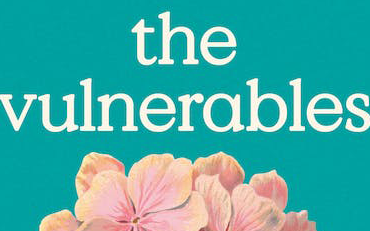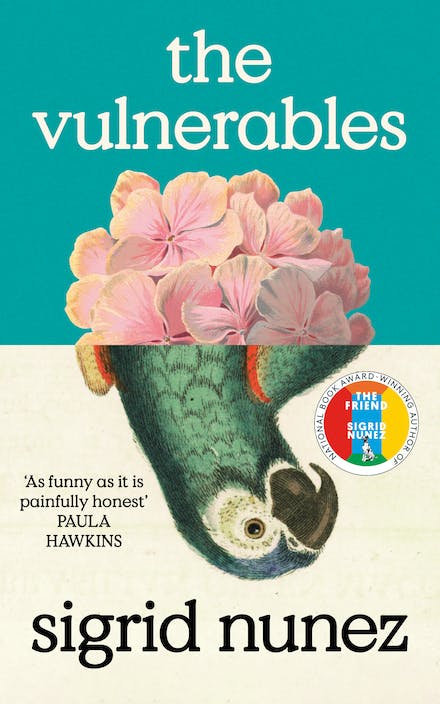
- Free Article: No
- Contents Category: Fiction
- Review Article: Yes
- Article Title: The Vulnerables
- Article Subtitle: Sigrid Nunez
- Online Only: No
- Custom Highlight Text:
What does it mean to narrate the humiliations of ageing, loneliness, and death in the first person when your background is working class? For such a writer, saying ‘I’ is political too, said Annie Ernaux in her Nobel Prize lecture, because it involves claiming an authority rarely granted in other parts of life. Ernaux uses her incendiary, affectless ‘I’ not just to recount one individual experience, but to transcend it. For ‘I’ to speak to the reader it must become, she says, ‘transpersonal’.
- Featured Image (400px * 250px):

- Alt Tag (Featured Image): Mireille Juchau reviews ‘The Vulnerables’ by Sigrid Nunez
- Book 1 Title: The Vulnerables
- Book 1 Biblio: Virago, $32.99 pb, 242 pp
- Book 1 Cover Small (400 x 600):

- Book 1 Cover (800 x 1200):

The Vulnerables is Nunez’s third novel in which a narrator is altered by the demands and rewards of care. In each, domesticated animals bring consolation. In The Friend (2018), the narrator bonds with a dead friend’s Great Dane. In What Are You Going Through (2020), the protagonist agrees to help a dying woman end her life. In the house they rent for this purpose, a cat delivers a four-page monologue. The Vulnerables is the most digressively chatty of these loosely linked works. A generous reading might see the novel’s wandering quality as a deliberate recreation of lockdown mental drift. Any attempt to stage that time faces its peculiar challenge: how to imbue stasis and sensory deprivation with vivacity? Voice, it turns out, is the most powerful tool at your disposal. Nunez’s narrator says, ‘I like this clarification by the narrator of a book by Stendhal: “It is not out of egotism that I say ‘I’; it is simply the quickest way to tell the story.”’
‘How do you reveal yourself without asking for love or pity?’ That’s Margo Jefferson, in the epigraph. How indeed when you are classified as ‘a vulnerable’, the double-edged term used to chastise the narrator for overstaying her outdoor time. To be ‘a vulnerable’ is to undergo special regulations under the guise of communal care. But in Trump’s America, ‘care’ is degraded. Walking through Union Square, the narrator hears a cyclist approaching. ‘Yo! Outta my way! […] But this was a pedestrian plaza. And what did he mean by bearing down on me, when there was plenty of space around us? […] Faceless in dark goggles and a black balaclava. As he wheeled past, he said, Ain’t you scared, lady?’ Later, he hawks, and coughs on her. She sprains her ankle and develops vertigo. What if she’d been badly injured? Would the distant staring witnesses have come to help?
After human-animal harmony is established in the condo, a young troubled vegan who is connected to the parrot’s owners, arrives to disturb it. He is staying, whether the narrator likes it or not, and his proprietorial attitude sparks her ornery side. Beyond this frame is a preoccupation with the writer’s role, partly because our narrator is creatively blocked. At times of crisis the writer has a greater purpose, Nunez suggests, bridging individual experience and enabling shared understanding. As the narrator ruminates on writing, she considers the novel she is trying to create: ‘Perhaps what is wanted in our own dark anti-truth times, with all our blatant hypocrisy and the growing use of story as a means to distort and obscure reality, is a literature of personal history and reflection: direct, authentic, scrupulous about fact.’
In a recent New York Times profile, Nunez rejected autofiction as an ‘inaccurate’ description of her work, because ‘memory is a less capacious mental mechanism than the imagination’. Aren’t both inextricable? What we remember is embellished by time, experience, the act of narration; and memory often grounds invented scenes that might otherwise float free of human fallibility.
Line after quoted or paraphrased line, Rousseau, Didion, Coetzee, Woolf, and others offer respite from Trumpian doublespeak and form an Interlude between Parts One and Two. Writers’ lives feature in many of Nunez’s books (especially her biography of Susan Sontag, Sempre Susan [2011]) but crescendo in The Vulnerables. If someone is known as a ‘writer’s writer’, this can only delight me. But at times these literary guiding lights outshine the novel’s more thinly drawn passages.
As the narrator comes to know her new housemate – handsome, arrogant, estranged from his parents, fighting with his girlfriend – she confronts her prejudices. Soon they are getting high on psilocybin, and she grudgingly accepts vegan meals. If the writer must transcend her consciousness to speak to the reader, so too pandemic ‘vulnerables’ must connect with others to survive. ‘For the writer, obsessive rumination is a must. Imagination must follow dark thoughts to dark places, you can’t ever just say, Stop, don’t go there. And isn’t that the job, to imagine the lives of others and what they are going through?’


Comments powered by CComment